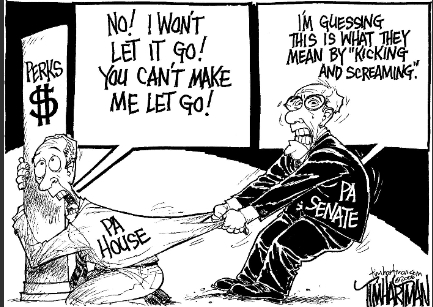By Tim Potts
The PA House of Representatives this week showed a bipartisan attitude toward improving public integrity for the first time since the Pay Raise of 2005. While neither party can claim to advocate the highest standards of public integrity in America for PA citizens, House Republican leaders since 2009 have put forward ideas while the then-majority House Democratic leaders put forward nothing but rhetoric. That changed with Tuesday’s adoption of some new rules, but by Wednesday the new bipartisan machinery stalled when it came time to adopt new policies.
Tuesday’s rules. The House Democrats’ new leadership joined with the new Republican majority’s leadership to begin making changes that integrity advocates have long wanted. House Resolution 1, the 44-page document that establishes the rules the House should follow for the next two years, includes changes to:
- Clarify that using tax-funded time, space and facilities for partisan political campaigns is prohibited. This reinforces state law that already makes such activity illegal.
- Prohibit lawmakers from donating expense reimbursements to charities. It has become common for lawmakers to make such donations, and get tax deductions, when challenged about accepting per diems and their annual COLA.
- Prohibit mass emails within 60 days of an election. The old rules prohibited only paper mailings.
- Streamline ceremonial resolutions by allowing a single vote, instead of separate votes, on any number of non-controversial resolutions.
Of course, it’s hard to be satisfied with rules changes. In House rule more of same (Jan. 5) the Scranton Times-Tribune points out the long history in the House and Senate of refusing to enforce their rules and frequently suspending them. This is why DR and other integrity advocates have called for laws, not rules, to make lasting improvements.
Wednesday’s policies. Hoping to build on the spirit of bipartisanship, Republican and Democratic leaders intended to bypass floor votes and accomplish more improvements. The plan was for the Bipartisan Management Committee of the House, consisting of the five top leaders, to adopt policies to:
- Require members to document expenses in order to receive reimbursements through per diems. Until now, the daily allowance has amounted to a second salary because lawmakers could claim up to $163 per day for expenses that, in many cases, were entirely fictional.
- Prohibit long-term leases of private cars. There is an exception for long-term leases arranged prior to March 2007. The House’s chief clerk will negotiate a master lease with the Department of General Services.
- Require members to pay 1% of gross wages toward their health care. If adopted, the House would match the Senate, which adopted the same requirement in 2007.
 That was the plan. But House leaders couldn’t pull it off yesterday, pending more negotiations. Pa. House measure to curb perks stalls out, The Philadelphia Inquirer, Jan. 6.
That was the plan. But House leaders couldn’t pull it off yesterday, pending more negotiations. Pa. House measure to curb perks stalls out, The Philadelphia Inquirer, Jan. 6.
That gives House leaders the chance to raise the ante with the Senate on paying for health insurance. Although a long-needed step in the right direction, the health insurance contribution neither saves significant money for taxpayers nor puts lawmakers in a position to know the struggle ordinary citizens face in obtaining health insurance. The total budget impact, based on budget line items for House salaries, amounts to roughly $637,000.
For individual lawmakers, the 1% contribution amounts to about $800 per year (rounding lawmakers’ base salary to $80,000). By comparison, ordinary citizens who can afford it would pay nearly twice that amount per month for comparable coverage.
Question:
- Will your representative encourage leadership to adopt even better changes to House policies?
Reapportionment: Testing bipartisanship. It’s hard to think of a tougher trial for a political relationship than the decennial process of re-drawing the borders of legislative districts. Even within parties, the process has been known to create life-long hostilities.
Following last year’s national census, the Legislative Reapportionment Commission this year will draw new lines for legislative districts, beginning with the election of 2012. The procedure in the PA Constitution that governs reapportionment, Article II, Section 17, is a baldly political one. Ten years ago, it produced the second most gerrymandered legislative districts in America, according to the U.S. League of Women Voters. Then, as now, Republicans controlled the House, Senate and governor’s office. Click here for an excellent report on the subject by the PA League.
One way citizens can test the new bipartisanship in the House is by the quality of the lines drawn this year.
Tonight at 8:00: WITF-TV’s “Smart Talk” will feature a segment on reapportionment, including DR’s Tim Potts. Go to www.witf.org .
Read more informative articles at Democracy Rising Pennsylvania
No comments:
Post a Comment